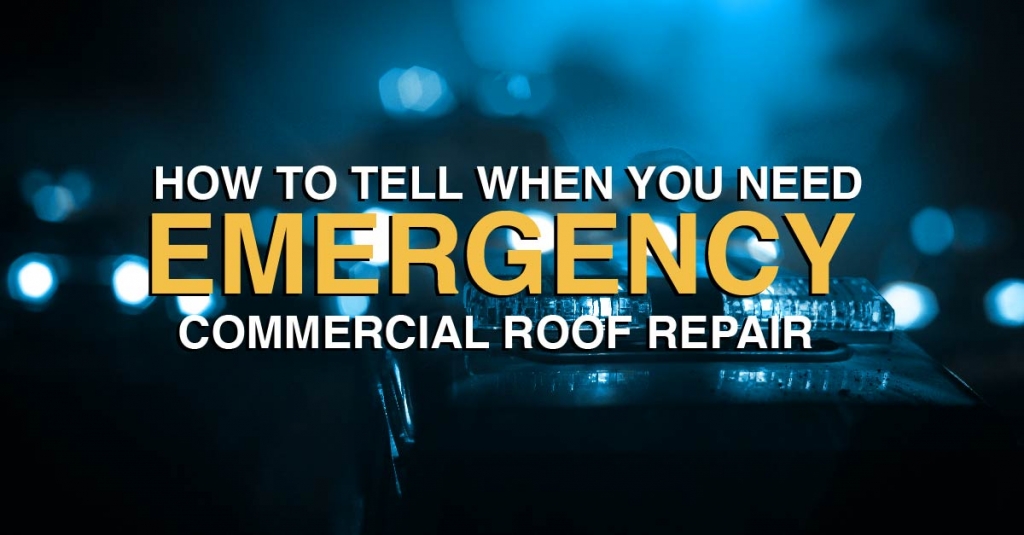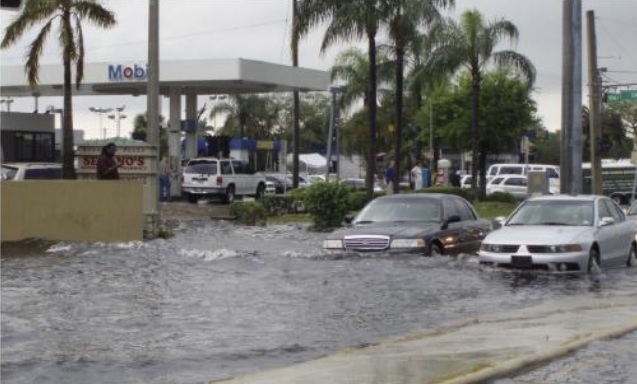Behind The Scenes Of Your Commercial Roof Anatomy with emergency roof repair.
We are in the Rainy Season in Florida, Water is not your Roofs Friend!
 If your commercial property sustains enough damage in a short enough time to cause you to consider shuttering the doors, you have an emergency repair. This could mean:
If your commercial property sustains enough damage in a short enough time to cause you to consider shuttering the doors, you have an emergency repair. This could mean:
- Storm damage
- A dangerous water leak
- A problem that puts expensive inventory and equipment at risk
Bear in mind that an emergency roof repair may not be a finished job. Tarping and other temporary measures can stave off further damage. Your local commercial roofer will return with a full crew at a later date to complete a thorough repair. This could mean two invoices, or it could open an insurance claim that stretches across weeks.
If you knew about a problem last week and chose not to call for help, you already know the problem is not an emergency. And yet, are you a roofing expert? That small leak may be the first sign of more extensive failure, which brings us to our second idea.
Checklist
Some factors making a roof repair an emergency, other than seeing intense damage in a short time, include:
- Widespread damage, as from winds or heavy rain
- A high volume of water infiltration
- Multiple leaks
- Sudden appearance of mold or smell of mildew
If In Doubt
If you are unsure a roof problem is an emergency or just a routine repair, call your contractor. Let your roofer make the decision. That small leak that is only dampening insulation under the single-ply membrane could develop into widespread mold. It could rot wooden roof deck members. It could find its way inside the building envelope and drip on inventory or office equipment.
Once you know a bit about commercial roof anatomy, you will realize you cannot wait when your flat roof “patient” is flatlining. You need to dispatch a commercial roofing partner to your roof, stat.
Commercial Roof Anatomy
No two low-slope (flat) commercial roofs are exactly identical. Their surfaces can be finished in several ways:
- Modified Bitumen (Mod-Bit) and Built-Up Roofing (BUR) — A tried-and true multi-ply system with granulated finishes applied hot or cold
- TPO — Rubber laminated systems
- PVC — PVC scrim systems
- Liquid-applied membrane and coatings — Acrylic, urethane, silicone
Three other types of commercial roofing are available for steep-slope roofs:
- Shingles
- Metal Roofs, including flat seam and standing seam
- Tiles
Basic roof structures are similar, and the vast majority of Florida commercial roofs are low-slope. Setting aside the steep-slope options, if we start at the top and dig down, we usually find:
- The exposed roofing surface (one of the materials mentioned above)
- Insulation (usually rigid sheets specially shaped to give the pitch)
- Vapor Barrier (prevents moisture moving into and out of the building envelope)
- Underlayment (additional waterproofing)
- Roof Deck (steel, wood, concrete, plywood, oriented-strand board)
- Steel or Wood Joists
Every layer represents centuries of trial-and-error improvements in building low-slope roofs.
Today we can install roofs that take Florida’s punishing weather, save energy costs, and last for decades with proper, professional maintenance.
Exposed Roofing Surface
The wide array of choices in surfacing your commercial roof makes close communication with your roofer essential. Your decision on a replacement roof depends on a lot of factors your roofer can explain:
- Age of your existing roof
- Ease of access
- Available budget
- Expected life span of the replacement
- Scheduling
- Noise and odor concerns
The best time to begin contemplating a reroof is long before your roof needs replacement. Enlist your commercial roofer for routine maintenance so the crews become familiar with your commercial roof anatomy. When you need to pick between TPO, BUR, or PVC, you can make the decision quickly and economically.
Every material has its pros and cons. Mod-Bit and BUR are among the oldest and least expensive but typically call for more roof maintenance and upkeep than TPO and PVC. PVC is a tough, long-lasting material that may be pricier than other choices at installation.
Liquid waterproofing coatings can extend the life of most roofs, but the coatings need to be compatible with the existing surface.
Your best advisor on a roofing surface — the skin of your commercial roof anatomy — is your local roofer.
Insulation
Large sheets of rigid board insulation form the layer that helps determine your roof’s slope and energy efficiency. Roof decks are built completely flat, but the shaped insulation provides adequate drainage to internal drains and parapet scuppers.
With deteriorating insulation, you will be ponding, slow drainage, and water infiltration.
Your commercial roofer specializes in dealing with this layer of commercial roof anatomy and can correct any compression or ponding issues before reroofing with the surface layer.
Vapor Barrier
As the American Institute of Architects (AIA) explains, most vapor barriers on commercial buildings are Class 1 vapor retarders. Vapor retarders slow the movement of both air and moisture into and out of your building.
This special layer of commercial roof anatomy saves money on energy costs, keeps the interior comfortable, and slows the rusting of steel joists and decking.
Underlayment
Underlayment can be synthetic or organic, but its main purpose is to inhibit moisture from reaching the roof deck. It is usually rolled out and can be either self-adhered chemically or physically attached with fasteners.
Roof Deck
Without the roof deck spanning the open spaces over the joists of your building, no roof could exist. A substantial, solid and structurally sound roof deck is essential. This layer of commercial roof anatomy forms the foundation for all the sheet and rolled goods applied atop it. It can be corrugated steel plates, poured concrete, wood timbers, plywood, or oriented-strand board (OSB).
If rust or rot infects your roof deck, you need your commercial roofer’s help immediately. Florida’s strong winds and heavy rains will punch holes right through a weak roof deck.
Steel or Wood Joists
Spanning the walls of your commercial building are the steel joists or, in some cases, wood beams or joists that hold up the roof and keep walls secure. Hurricane codes call for strong ties between walls and roofs, and those ties focus on these joists. Think of these joists as the skeleton holding your building together. Let your commercial roofer help you become familiar with your building’s commercial roof anatomy. Routine maintenance and roof repairs will pay off with cost-efficient, fast reroofing when the time is right. Neglecting a commercial roof could cost you your business. We have the prescription. Contact us at PSI Roofing today to keep your flat roof in good health.
Tags:
Building Maintenance,
Management News,
Members Articles









 If your commercial property sustains enough damage in a short enough time to cause you to consider shuttering the doors, you have an emergency repair. This could mean:
If your commercial property sustains enough damage in a short enough time to cause you to consider shuttering the doors, you have an emergency repair. This could mean: COVID-19 has reshaped the way that we approach many aspects of our lives, and in many cases, has redetermined how we view and manage our spaces, homes and properties. Given the increased attention to how a virus can spread through contact and surfaces, in the reopening process real estate professionals and property managers will have to determine how to ensure that properties are safe so that the virus cannot be easily spread. Below, we’ll discuss how managing properties will change after lockdown ends and we all begin to assimilate to a new sense of normalcy.
COVID-19 has reshaped the way that we approach many aspects of our lives, and in many cases, has redetermined how we view and manage our spaces, homes and properties. Given the increased attention to how a virus can spread through contact and surfaces, in the reopening process real estate professionals and property managers will have to determine how to ensure that properties are safe so that the virus cannot be easily spread. Below, we’ll discuss how managing properties will change after lockdown ends and we all begin to assimilate to a new sense of normalcy.



 When developers create residential communities and commercial areas, they need to take into account how much water needs to be stored or moved in order to prevent the project from flooding during major rain events. Through careful planning and design, they route stormwater away from our homes and into a system of lakes and canals. The size and number of lakes in our communities are a result of those calculations. Lakes are dug to create a storage area for water runoff from storms. The fill dug from the lakes is then used to raise the elevation of the homes around them.
When developers create residential communities and commercial areas, they need to take into account how much water needs to be stored or moved in order to prevent the project from flooding during major rain events. Through careful planning and design, they route stormwater away from our homes and into a system of lakes and canals. The size and number of lakes in our communities are a result of those calculations. Lakes are dug to create a storage area for water runoff from storms. The fill dug from the lakes is then used to raise the elevation of the homes around them.
